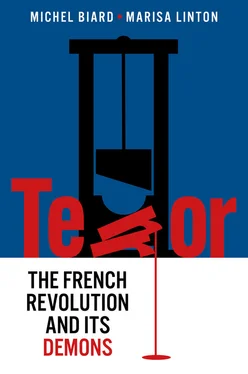In the weeks that followed Tallien’s speech, another new term would be coined, that of ‘terrorist’, to define those who had supported the ‘system of terror’.
The hunt for Robespierre’s surviving ‘subalterns’ started right away. The next day, 12 Fructidor, the deputy, Lecointre denounced seven former members of the two major committees, among them Billaud-Varenne, Collot d’Herbois, and Barère. The denunciation was timed to follow on from Tallien’s speech. While the accusation was rejected as slanderous, it was followed a month later with a second denunciation, made by another deputy, Legendre, against the three former members. Vadier took it up and an investigative committee was created. 17
Contrary to Tallien’s claims, when Barère had denounced Robespierre and his ‘co-conspirators’ on behalf of the Committee of Public Safety on 11 Thermidor, he had made no mention of a ‘system’ they had put in place. Rather, Barère’s denunciation had followed a standard pattern amongst revolutionary factions, of accusing the four deputies who had been executed the previous day of having usurped public authority to make themselves rulers of France, a triumvirate of tyrants. Such accusations owed much to a common trope in revolutionary politics of accusing opponents of imitating Catiline’s conspiracy to overthrow the Roman Republic. 18According to Barère’s hastily-manufactured charges, Robespierre was supposed to ‘reign’ over Paris and the central part of the Republic, Saint-Just over the North (a fabrication based on his having served as a deputy on mission to the armies on the northern fronts and the Rhine), whilst Couthon and Robespierre’s brother, Augustin, would rule over the South. 19Not one word was said on the fifth deputy who died on 10 Thermidor, Le Bas, who chose to commit suicide rather than have the Convention send him to the guillotine with his friends. Barère’s speech contributed to the black legend of Robespierre, the ‘new Catiline’, stories which started circulating in the summer of 1794, if not earlier. 20While Barère’s speech was fundamentally different from Tallien’s in almost every respect, they had one key thing in common: the Convention and its committees (including, of course, themselves) had no responsibility for the ‘terror’ – it was the fault of other men. Dissenting voices could hardly rise to be heard. Thus Cambon was not heard at all when, in spite of denouncing Robespierre and ‘his system of terror’, he also pointed out that a number of exceptional institutions had been created by decrees voted in, quasi-unanimously, by the Convention to meet the crisis: ‘Take note that we are not in an ordinary time; take note that the Declaration of Rights did not institute surveillance committees, and yet you have unanimously judged them necessary.’ 21
The Convention had given itself an amnesty for its actions in supporting crisis measures enabling terror. It gave itself this absolution by making Robespierre the scapegoat, the so-called sole ‘mastermind’ behind a ‘reign of terror’. As a consequence, over the next two centuries, Robespierre would be remembered as the originator and master of the ‘terror’, an all-powerful dictator who had stifled all debate by imposing his domination over the Convention and kept adding names to endless interminable lists of undesirables, a tyrant who dreamed of being crowned king by marrying the daughter of Louis XVI so as to be tied in blood to the Bourbon line, a ferocious triumvir who imposed his authority upon Saint-Just and Couthon (Augustin Robespierre, mentioned by Barère, quickly disappeared from the group, not only to refine the formula of a conspiratorial triumvirate inspired by antiquity but also because he was not condemned to death for any reason except his family name, as no crime could be pinned on him). This allowed the Convention to spread the news over the entire national territory and to the armies, presenting Thermidor as the fall of yet another faction that would have usurped the sovereignty of the nation. A flood of letters gushed in to Paris in the summer and autumn of 1794. Written in a language laden with clichés and a limited, stereotyped range of vocabulary, they give an idea of how the news had been circulated to the provinces and how local authorities, popular societies and simple citizens saluted the Convention for its fine deed against ‘the infamous Robespierre’ or the ‘monstrous triumvirate’. 22
Many pamphlets and brochures came out in the weeks after Thermidor, some waxing on the popular motif of ‘Robespierre’s queue ’ – literally ‘Robespierre’s tail’ (meaning the remains of his faction, but also a term with a humorous phallic connotation) 23or the arrival of Robespierre and the Jacobins into hell. 24Among this mass of writings, the blood spilled in the execution of the ‘system of the terror’ occupied pride of place, while the sexualized humour offered light relief, attracting readers whilst giving an opportunity to exorcize fear through laughter: thus, ‘the revolution’s events often give new words to the republican dictionary – and here is one that makes all the women laugh: everyone wants to know his queue : Robespierre’s queue , give me his queue , respond to the queue , defend your queue , cut off the queue .’ 25
Mixing the Incorruptible’s queue with his descent into hell, a supposed letter that Robespierre’s ghost sent to his followers from the other side, claims that he explained to the ‘tribunal of hell’ that he wished to apply a ‘policy … just like yours’, sharpening the ‘liberticide daggers’, robbing fortunes, destroying commerce, spreading famine, protecting brigands, ‘immolating so many men in the name of humanity’ – in short, ‘put terror in power’. 26As Robespierre’s ghost adds that it would have ‘taken five mortal years to arrive at [his] goal’, the author provides a chronological list of the projects put in place for the ‘reign of the terror’ between summer 1789 and summer 1794. The political demonstration imparted two ideas to the reader: on the one hand, Robespierre had been moved by an ambition to impose a bloody dictatorship from the beginning of the Revolution; and, secondly, that his execution put an end to ‘the reign of the terror’, an expression with a long life ahead of it. 27Tallien’s political analysis is confirmed, with the word ‘terror’ having a widely different meaning in 1794 than it had in 1789, to say nothing of the fact that ‘terror as the order of the day’ had never been imposed by Robespierre and his supporters.
2. Developing use of the word ‘terror’ between 1789 and 1794
As we shall see in the following chapter, the term ‘terror’ was already familiar to the revolutionaries of 1789 from a number of contexts, both political and non-political. In the first period of the Revolution, including up to the crisis point of 1794 when a new political meaning triumphed, these diverse meanings of ‘terror’ continued to circulate.
In the autumn of 1792, a letter in the newspaper Le Moniteur reported how French troops entered Belgium after the victory at Jemappes (6 November): ‘Dumouriez is at the gates of Brussels. Terror precedes the republic’s victorious armies. The despots and their cowardly servants are on the run.’ 28In the first months of the Vendée uprising in 1793 (on the Vendée, see chapter 7), ‘terror’ was often used in its military, not political, meaning, as in a terror inflicted by soldiers, as two news items in Le Moniteur on 2 July show. The first, a dispatch from the northern front, related that ‘the French victory near Arlon had truly instilled terror in the area, so much so that the boat masters of Trier had received an order to keep their boats nearby in order to transport the warehouses further away.’ 29The second item, a letter from General Westermann, announced that ‘the terrible example of Amailloux and the castle of Lescure sowed terror among the lost inhabitants’. Amailloux was a town in which Westermann’s troops hunted down the Vendéen rebels, burning down buildings and killing a number of inhabitants while the general proclaimed that any village providing aid or recruits to the rebels would suffer the same fate. That same day, he burnt down the castle of Clisson, residence to Lescure, one of the Vendéen leaders. This recourse to terror did not, in itself, seem to raise any doubt, considering that the convergence of these two events, on different military fronts, one exterior, the other interior, shows that the military meaning of the term was well accepted. On the other hand, the fact that the example Westermann wished to give affected not only the armed rebels but also civilians testifies to the horrors of a local civil war. This military meaning of ‘terror’, furthermore, never stopped being operative, with numerous examples available from debates in the Convention and published writings in the press. On 16 Messidor Year II (4 July 1794) for example, about three weeks before 9 Thermidor and in the middle of the month with the greatest number of executions by guillotine in Paris, Barère used ‘terror’ in a military sense, not a political one, even if he was careful to employ the fashionable political rhetoric of the time on the notion of the ‘order of the day’:
Читать дальше












